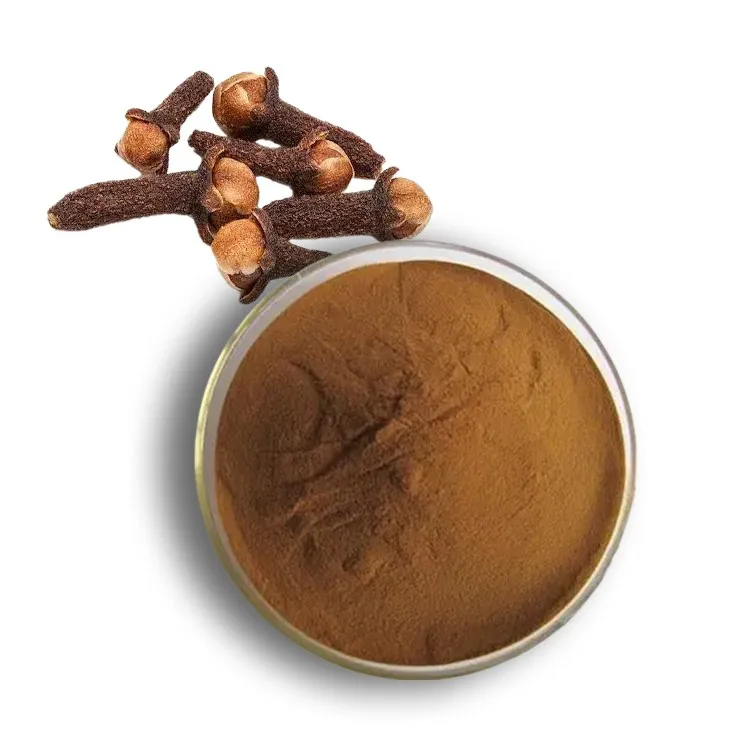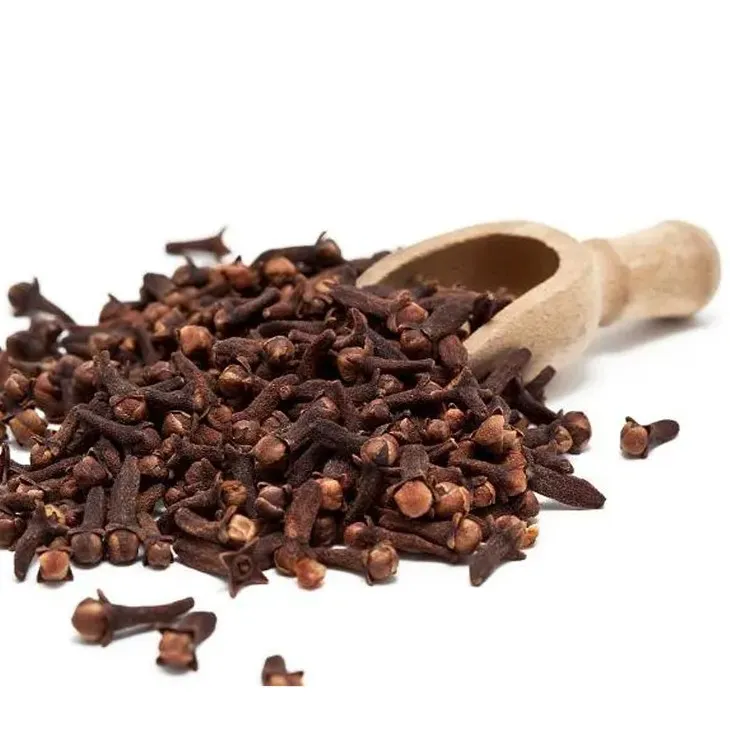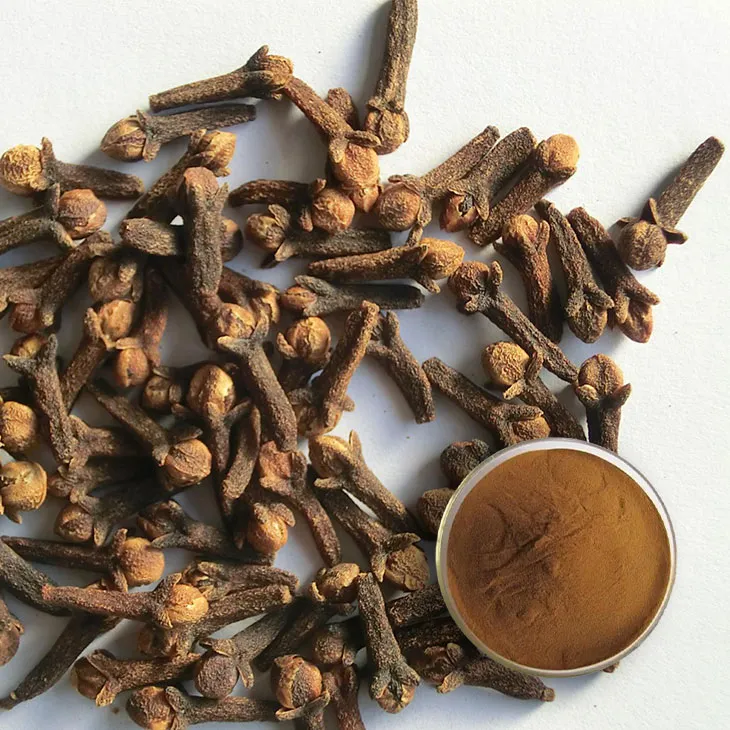- 0086-571-85302990
- sales@greenskybio.com
What is clove powder and why is it used on the skin?
2024-11-12

1. Introduction to Clove Powder
Clove Powder is a remarkable natural substance that has been used for various purposes for centuries. It is derived from the dried flower buds of the clove tree, scientifically known as Syzygium aromaticum. These small, dark brown buds are native to the Maluku Islands in Indonesia, but are now cultivated in many tropical regions around the world.
Clove Powder has a distinctively warm, spicy, and slightly sweet aroma. This aroma is a result of the numerous chemical compounds present in the powder, such as eugenol, which gives it its characteristic smell. Eugenol not only contributes to the scent but also plays a significant role in the powder's beneficial properties for the skin.

2. Antioxidant Qualities of Clove Powder
2.1 Understanding Free Radicals
Before delving into how clove powder combats free radicals, it is essential to understand what free radicals are. Free radicals are unstable molecules that are produced in the body as a result of normal metabolic processes, exposure to environmental factors such as pollution, ultraviolet (UV) radiation, and cigarette smoke. These molecules have an unpaired electron, which makes them highly reactive.
When free radicals react with cells in the body, they can cause damage to the cell membranes, DNA, and proteins. This damage is cumulative over time and is one of the leading causes of premature aging. It can also contribute to the development of various skin problems, including wrinkles, fine lines, and a dull complexion.
2.2 How Clove Powder Fights Free Radicals
Clove powder's antioxidant properties come into play in the fight against free radicals. Antioxidants are substances that can neutralize free radicals by donating an electron to them without becoming reactive themselves. The eugenol in clove powder is a powerful antioxidant. It scavenges free radicals in the skin, preventing them from causing damage to the skin cells.
By reducing the oxidative stress caused by free radicals, clove powder helps in maintaining the integrity of the skin cells. This, in turn, can lead to a reduction in the signs of aging. Regular use of products containing clove powder may result in a more youthful - looking complexion, with fewer wrinkles and fine lines. The skin may also appear more radiant and healthy as the antioxidant action helps to protect the skin's natural glow.

3. Antiseptic Properties of Clove Powder
3.1 Importance of Antiseptics for the Skin
The skin is the body's first line of defense against external pathogens. However, it is constantly exposed to bacteria, viruses, and fungi, which can cause infections, especially when there are cuts, wounds, or abrasions on the skin. Antiseptics are substances that can kill or inhibit the growth of these microorganisms on living tissue, thereby preventing infections.
Using antiseptic products on the skin is crucial for maintaining skin health. It helps in keeping minor wounds clean, promoting faster healing, and reducing the risk of complications such as cellulitis (a bacterial skin infection) or fungal infections like ringworm.
3.2 Clove Powder as an Antiseptic
Clove powder has excellent antiseptic properties, mainly due to its high eugenol content. Eugenol has been shown to have antimicrobial activity against a wide range of bacteria, including Staphylococcus aureus and Escherichia coli, which are common causes of skin infections. It also has antifungal properties, making it effective against fungal species that can infect the skin.
When applied to a wound or an area of irritated skin, clove powder can help to create an environment that is unfavorable for the growth of microorganisms. It can kill existing bacteria and fungi, reducing the risk of infection. This antiseptic action also aids in the wound - healing process. By preventing infection, the body can focus on repairing the damaged tissue more effectively, leading to faster healing of cuts, scrapes, and other minor skin injuries.

4. Other Benefits of Clove Powder for the Skin
4.1 Anti - inflammatory Effects
In addition to its antioxidant and antiseptic properties, clove powder also has anti - inflammatory effects. Skin inflammation can be caused by various factors, such as allergies, irritants, or skin conditions like eczema and psoriasis. Inflammation in the skin can lead to redness, swelling, itching, and discomfort.
The compounds in clove powder can help to reduce inflammation in the skin. By modulating the body's inflammatory response, it can alleviate the symptoms associated with skin inflammation. This can be particularly beneficial for those with sensitive skin or chronic skin conditions, as it can provide relief from the discomfort and improve the overall appearance of the skin.
4.2 Exfoliating Properties
Clove powder can also act as an exfoliant for the skin. The small particles in the powder can help to gently slough off dead skin cells from the surface of the skin. This process of exfoliation is important for maintaining healthy - looking skin.
Regular exfoliation with clove powder can improve skin texture, making it smoother and softer. It can also enhance the absorption of other skincare products, as removing the layer of dead skin cells allows for better penetration of moisturizers, serums, and other beneficial substances. However, it is important to use clove powder as an exfoliant in moderation, as over - exfoliation can damage the skin barrier and lead to irritation.
5. How to Use Clove Powder on the Skin
5.1 DIY Clove Powder Masks
One popular way to use clove powder on the skin is by making DIY masks. Here is a simple recipe for a clove powder mask:
- Mix 1 - 2 teaspoons of clove powder with a small amount of honey (about 1 teaspoon) and a few drops of water to form a paste.
- Cleanse your face thoroughly before applying the mask.
- Apply the paste evenly to your face, avoiding the eye area.
- Leave the mask on for 10 - 15 minutes.
- Rinse off the mask with warm water and pat your face dry.
The honey in this mask adds additional moisturizing and antibacterial properties, while the clove powder provides its antioxidant, antiseptic, and exfoliating benefits.
5.2 Clove Powder in Skincare Products
Clove powder can also be found in many commercial skincare products. Look for products such as creams, lotions, and serums that contain clove powder or its active compound, eugenol. These products are formulated to be safe and effective for use on the skin.
When using skincare products containing clove powder, it is important to follow the instructions on the product label. Start by using a small amount of the product on a small area of the skin to test for any potential allergic reactions. If there are no adverse effects, you can continue to use the product as directed.
6. Precautions When Using Clove Powder on the Skin
6.1 Allergic Reactions
Although clove powder is generally considered safe for use on the skin, some people may be allergic to it. Allergic reactions can range from mild redness and itching to more severe symptoms such as swelling and difficulty breathing. If you experience any signs of an allergic reaction after using clove powder on your skin, discontinue use immediately and seek medical attention if necessary.
6.2 Skin Sensitivity
Clove powder can be quite potent, especially in its pure form. If you have sensitive skin, it is advisable to use it in moderation or after diluting it with other milder ingredients. Applying undiluted clove powder directly to sensitive skin may cause irritation, redness, or a burning sensation.
6.3 Avoiding Contact with Eyes
When using clove powder on the face or other parts of the body, it is crucial to avoid getting it in the eyes. Clove powder can cause severe irritation to the eyes, leading to redness, pain, and potential damage to the eye tissues. If clove powder does come into contact with the eyes, rinse them thoroughly with clean, cool water immediately and seek medical advice if the irritation persists.
7. Conclusion
Clove powder is a truly remarkable natural ingredient with a wide range of benefits for the skin. Its antioxidant, antiseptic, anti - inflammatory, and exfoliating properties make it a valuable addition to any skincare routine. Whether used in DIY masks or incorporated into commercial skincare products, clove powder can help to combat the signs of aging, prevent skin infections, reduce inflammation, and improve skin texture.
However, it is important to use clove powder with caution, especially if you have sensitive skin or are prone to allergic reactions. By following the proper precautions and using it correctly, you can harness the power of clove powder to achieve healthy, beautiful skin.
FAQ:
What are the main components of clove powder?
Clove powder is mainly composed of eugenol, which is responsible for many of its beneficial properties such as antioxidant and antiseptic effects. It also contains small amounts of other compounds like flavonoids and tannins that contribute to its overall function.
Can clove powder be used directly on the skin?
While clove powder can be used on the skin, it is often advisable to mix it with a suitable carrier oil or other mild substances. Pure clove powder may be too strong and could potentially cause irritation in some individuals, especially those with sensitive skin.
How does clove powder prevent skin infections?
Clove powder has antiseptic properties due to its eugenol content. Eugenol can inhibit the growth of bacteria, fungi, and other microorganisms that may cause skin infections. By applying clove powder - based preparations on the skin, it creates an environment that is less favorable for these pathogens to thrive.
Are there any side effects of using clove powder on the skin?
Yes, there can be side effects. Some people may experience skin irritation, redness, or allergic reactions when using clove powder on the skin. It is recommended to do a patch test on a small area of skin first to check for any adverse reactions.
How can one incorporate clove powder into a skin care routine?
One can mix a small amount of clove powder with a carrier oil like coconut oil or olive oil and use it as a topical application. It can also be added to homemade face masks or scrubs in small quantities for added skin benefits.
Related literature
- The Antioxidant and Antimicrobial Properties of Clove Extracts for Skin Health"
- "Clove Powder in Dermatological Applications: A Review"
- "Beneficial Effects of Natural Compounds like Clove Powder on Skin Aging"
- ▶ Hesperidin
- ▶ citrus bioflavonoids
- ▶ plant extract
- ▶ lycopene
- ▶ Diosmin
- ▶ Grape seed extract
- ▶ Sea buckthorn Juice Powder
- ▶ Beetroot powder
- ▶ Hops Extract
- ▶ Artichoke Extract
- ▶ Reishi mushroom extract
- ▶ Astaxanthin
- ▶ Green Tea Extract
- ▶ Curcumin Extract
- ▶ Horse Chestnut Extract
- ▶ Other Problems
- ▶ Boswellia Serrata Extract
- ▶ Resveratrol Extract
- ▶ Marigold Extract
- ▶ Grape Leaf Extract
- ▶ blog3
-
High purity olive leaf extract
2024-11-12
-
Lavender oil extraction method
2024-11-12
-
100% organic virgin sea buckthorn fruit oil
2024-11-12
-
Lotus leaf extract powder factory in China
2024-11-12
-
China aged garlic extract supplier
2024-11-12
-
Deer antler extract powder manufacturer
2024-11-12
-
Saw palmetto extract vs whole herb
2024-11-12
-
Camu Camu Extract
2024-11-12
-
Alfalfa Meal
2024-11-12
-
Red Vine Extract
2024-11-12
-
Peppermint Extract Powder
2024-11-12
-
Shikonin
2024-11-12
-
Tormentil Extract
2024-11-12
-
Sea buckthorn oil
2024-11-12
-
Lotus leaf extract
2024-11-12
-
Purple Sweet Potato Extract
2024-11-12
-
Eyebright Extract
2024-11-12





















